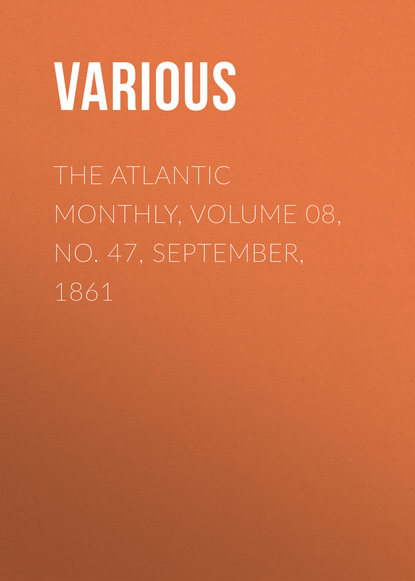По всем вопросам обращайтесь на: info@litportal.ru
(©) 2003-2024.
✖
The Atlantic Monthly, Volume 08, No. 47, September, 1861
Автор
Год написания книги
2018
Настройки чтения
Размер шрифта
Высота строк
Поля
40
The Poetical Decameron, or Ten Conversations on English Poets and Poetry, particularly of the Reigns of Elizabeth and James I. London, 1820.
41
Reply, p. 22.
42
Rev. N.L. Frothingham, D.D., in the Christian Examiner for November, 1853.
43
Splendor of the Father's glory,
Bringing light with cheering ray,
Light of light and fount of brightness,
Day, illuminating day!
In our prayers we call thee Father,
Father of eternal glory,
Father of a mighty grace:
Heal our errors, we implore thee!
Form our struggling, vague desires;
Power of spiteful spirits break;
Help us in life's straits, and give us
Grace to suffer for thy sake!
Christ for us shall be our food;
Faith in him our drink shall be;
Hopeful, joyful, let us drink
Soberness of ecstasy!
Joyful shall our day go by,
Purity its dawning light,
Faith its fervid noontide glow,
And for us shall be no night!
44
"'Neath Saint Michael's watch is given
Peace on earth and peace in heaven."
45
The Book of the Aquarium, by Sidney Hibbert.
46
Hibbert's Book of the Aquarium.
47
Percival.
48
Admiral Vernon (whose name is familiar to every American,—Mount Vernon was named in his honor) was in command of the British fleet in the Spanish Main. General Wentworth, an officer "without experience, authority, or resolution," had command of the land forces in the West Indies. All the North American, colonies, except Georgia, which was too recently settled, and whose own borders were too much exposed, had been called upon to give aid to the expedition against the Spaniards, and a regiment thirty-six hundreds strong was actually supplied by them. The war was one in which the colonists took an active interest.
49
This little, indifferent phrase refers to one of the most shocking and cruel incidents of the colonial history of New York, the result of a delusion "less notorious," says Mr. Hildreth, (Hist, of the United States, ii. 391,) "but not less lamentable, than the Salem witchcraft. The city of New York now contained some seven or eight thousand inhabitants, of whom twelve or fifteen hundred were slaves. Nine fires in rapid succession, most of them, however, merely the burning of chimneys, produced a perfect insanity of terror. An indented servant-woman purchased her liberty and secured a reward of one hundred pounds by pretending to give information of a plot formed by a low tavern-keeper, her master, and three negroes, to burn the city and murder the whites. This story was confirmed and amplified by an Irish prostitute convicted of a robbery, who, to recommend herself to mercy, reluctantly turned informer. Numerous arrests had been already made among the slaves and free blacks. Many others followed. The eight lawyers who then composed the bar of New York all assisted by turns in behalf of the prosecution. The prisoners, who had no counsel, were tried and convicted upon most insufficient evidence. Many confessed to save their lives, and then accused others. Thirteen unhappy convicts were burned at the stake, eighteen were hanged, and seventy-one transported." Such are the panics of a slaveholding community!
50
At this time much of the agricultural and domestic labor in the colonies, especially south of New England, was performed by indented servants brought from Great Britain, Ireland, and Germany. They were generally an ill-used class. Their services were purchased of the captains who brought them over; the purchaser had a legal property in them during the time they were bound for, could sell or bequeath them, and, like other chattels, they were liable to be seized for debts.
51
Captain, afterward Sir Peter Warren, was a distinguished naval officer in his day. In 1745 he was made Rear-Admiral for his services at the siege of Louisbourg. He married in New York.
52
The report of the taking of Cartagena was false, and the colonists were greatly disappointed at the failure of Vernon's great enterprise.
53
Five hundred additional men were sent from Massachusetts to take part in this new expedition. It was a total failure, like the preceding one, and Few of the colonial troops lived to return home.
54
Perhaps a misspelling of Occacoke, an island on the coast of North Carolina.
55
General Oglethorpe, who was at this time the victim of unfavorable reports and calumnious stories, that had been spread by disaffected members of the infant settlements in Georgia, and by some of the officers who had served under him in his unsuccessful attempt to reduce the town of Saint Augustine in Florida, "The fort at Saint Augustine," to which the writer of this Journal refers, as having been taken while under the command of Oglethorpe, was Fort Moosa, three miles from Saint Augustine, where a detachment of one hundred and thirty-seven men, under Colonel Palmer of Carolina, had been attacked by a vastly superior force of Spaniards, negroes, and Indians, and had been cut off almost to a man. This misfortune seems to have been due to Colonel Palmer's disregard of Oglethorpe's orders, and Oglethorpe himself was in no way responsible for it, although the popular blame fell on his shoulders.











